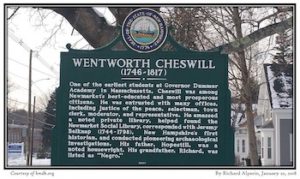
Wentworth Cheswill (plaque)
Wentworth Cheswell was born on this date in 1746. He was a Black businessman and politician.
From Newmarket, NH, Cheswell was the only child of Hopestill and Catherine Keniston Cheswell. There is virtually no information about Catherine Keniston in Newmarket town records. However, the various local historians and genealogists generally accepted that she came from a local Newmarket/Durham family and was white. Wentworth Cheswell was born to a white mother like his father before him.
Young Cheswell was a key figure in New Hampshire politics and the son of Hopestill Cheswell, a well-known pre-Revolutionary house builder. The elder Cheswell, a Mulatto, was an independent Black man who held a vital business position during slavery. The younger Cheswell, too, excelled in local politics. Named for Royal Governor Benning Wentworth, he attended Dummer Academy. He was a justice of the peace and yeoman landowner, and like Paul Revere, Cheswell made a midnight ride on horseback to warn New Hampshire residents of the coming of British soldiers.
In Newmarket, NH, he served as town assessor, selectman, and coroner. He preserved vital town records and helped start the first private library in Newmarket. From 1768, when he was elected constable until he died in 1817, Cheswell held a succession of town or local government positions. Besides serving as assessor, town auditor, and coroner, he also voted as a selectman. From his appointment in 1805 onwards, Wentworth Cheswell exercised the authority of Rockingham County's Justice of the Peace.
His life was used in public debate during the 1820 Missouri Compromise as an example of how Blacks could be equal in society with whites. Richard Alperin, who lives nearby on the site of the former Cheswell home, is currently researching and restoring his gravesite. Cheswell died on March 8, 1817, at the age of 71.
"A PEOPLE OF COLOR":
A Study of Race and Racial Identification in New Hampshire, 1750-1825
by Erik R. Tuveson, B.A.,
Colgate University, 1992